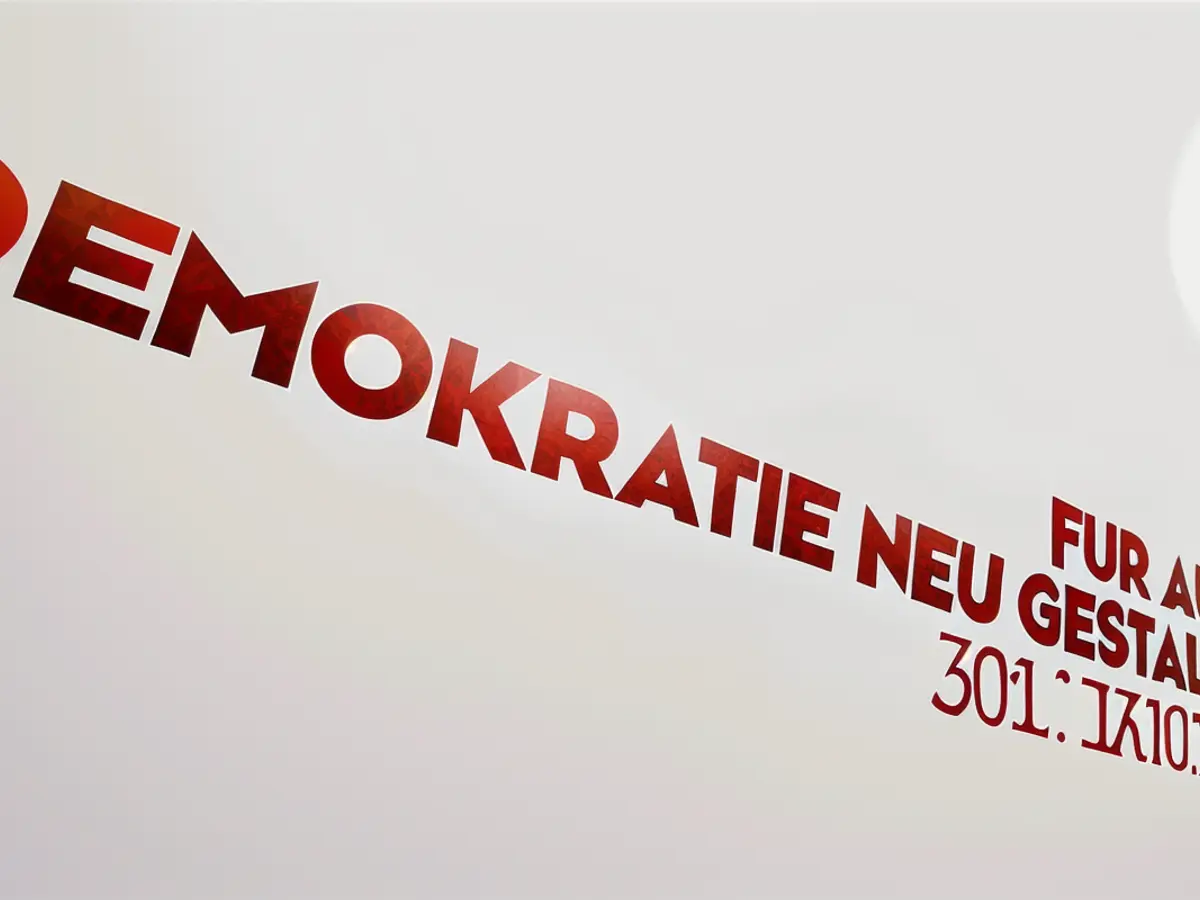Showcase - In place of elections, a ballot via lottery? Bundeskunsthalle examines the workings of democracy.
Democracy demands much. In the Bundeskunsthalle, there are two large pumps that can raise a fallen hull back to life. Gradually, the impressive "Goddess of Democracy" then rises up to the ceiling and waves its torch like the Statue of Liberty in New York. "When you lean back, the air escapes," says curator Johanna Adam, as she prepares for the pumping. "And democracy is not a service offered to us. We are not the customers of democracy, we are the operators."
"For all! Redesigning democracy" is an exhibition at the Bundeskunsthalle from May 30 to October 13, 2024, appropriately timed with 75 years of the Basic Law and the founding of the Federal Republic of Germany. It's also timely with the threat many liberal democracies face by right-wing populists and autocrats.
Only half of the population is content with the state of democracy
In a recently released survey on the global perception of democracy ("Democracy Perception Index"), 85% of respondents considered democracy important, but only slightly over half were happy with the state of democracy in their country. In Hungary, for example, only 31% feel they live in a democracy.
Voting for right-wing populist parties regularly reveals that citizens feel disempowered: they feel controlled by elites, not represented in parliament and government, and cannot influence political decisions.
"We ask two questions in this exhibition," explains Adam. "On the one hand, what foundations does our democracy rest on? And on the other hand, where does it hurt - and what can we do about it?" The exhibition mostly considers itself as a collection of ideas - it does not provide ready-made solutions.
How ancient Greeks distributed political offices
One of the most fascinating exhibits is a reconstructed "Kleroterion" from classical Greece, a lottery machine with which almost all political positions were distributed in Athens. "The core of democracy is lottery, not voting," claimed the philosopher Aristotle. Voting was viewed as aristocratic by the ancient Greeks because only the most popular ones emerged, but, for example, never the shy ones. Only the lottery seemed truly democratic to them. And since each position was only held for one year, every citizen had a realistic chance of coming to power in their lifetime, except for women, slaves, and foreigners, who were excluded from participation in the people's assembly and all political positions. On average, 6,000 citizens participated in the boisterous people's assemblies at least 40 times a year, given the manageable population size of Athens, this was a broad direct participation.
The idea of organizing democracy through lottery systems has gained increasing attention in political science in recent years. The focus of these thoughts is on better reflecting the social structure of the population within political assemblies, as is currently not the case, for example, in the German Bundestag. However, most scientists believe that lottery systems should not replace elections as the main way to coordinate political action - this would not even be constitutionally possible. If, on the other hand, there are specific decisions to be made at the local level, the drawing of a citizen assembly is regarded as a viable option.
Democratic participation can also take the form of referendums, as frequently happens in Switzerland and was the case in Britain with the Brexit decision. Demonstrations play a central role in political expression in every democracy. This year, millions of German citizens have demonstrated against the right, potentially contributing to the decline of the AfD in the polls. Climate activists have managed to attract a lot of attention, even in small groups, for example, by gluing themselves to the street. Adam views these activists as part of a tradition. "What climate activists are demonstrating today in terms of protest, in historical terms, is not overdimensional." The suffragettes didn't hurl tomato sauce on paintings protected by plexiglass, but cut them.
The exhibition in Bonn is, therefore, not only a traditional art exhibition but an enticing invitation to reconsider democracy. Many approaches and theories are explored. Only the "Kiosk of Simple Answers", a work by the Rostock artist group Schaum, has remained closed the whole time.
Information about the exhibition from the Bundeskunsthalle. linkedin.com
Read also:
- Caught up in the present: the end of "The Crown"
- Through New Year's Eve with TV shows
- What's next for the series hits?
- Which shows will be on?
- The "For all! Redesigning democracy" exhibition at the Bundeskunsthalle in North Rhine-Westphalia, Germany, runs from May 30 to October 13, 2024, and explores the foundations and challenges of democracy in the Federal Republic of Germany.
- The exhibition in Bonn also features a reconstructed "Kleroterion" from classical Athens, a lottery machine used to distribute political positions in ancient Greece, highlighting the ancient Greek belief that democracy is rooted in lottery, not voting.
- Despite the importance of democracy, only half of the population is content with its state, according to a recent global perception survey. This dissatisfaction is often reflected in the voting for right-wing populist parties, who promise to give power back to the people.
- The Bundeskunsthalle exhibition in North Rhine-Westphalia, Germany, does not provide ready-made solutions, but instead encourages visitors to reflect on the foundations and challenges of democracy.
- Art can also play a role in promoting democratic participation, as seen in demonstrations and activism that have influenced political decisions in democracies like Switzerland and the UK.
- In Hungary, only 31% of people feel they live in a democracy, highlighting the threat many liberal democracies face from right-wing populists and autocrats. The Bundeskunsthalle exhibition in Germany seeks to address these challenges and explore ways to strengthen and improve democracy.
Source:








